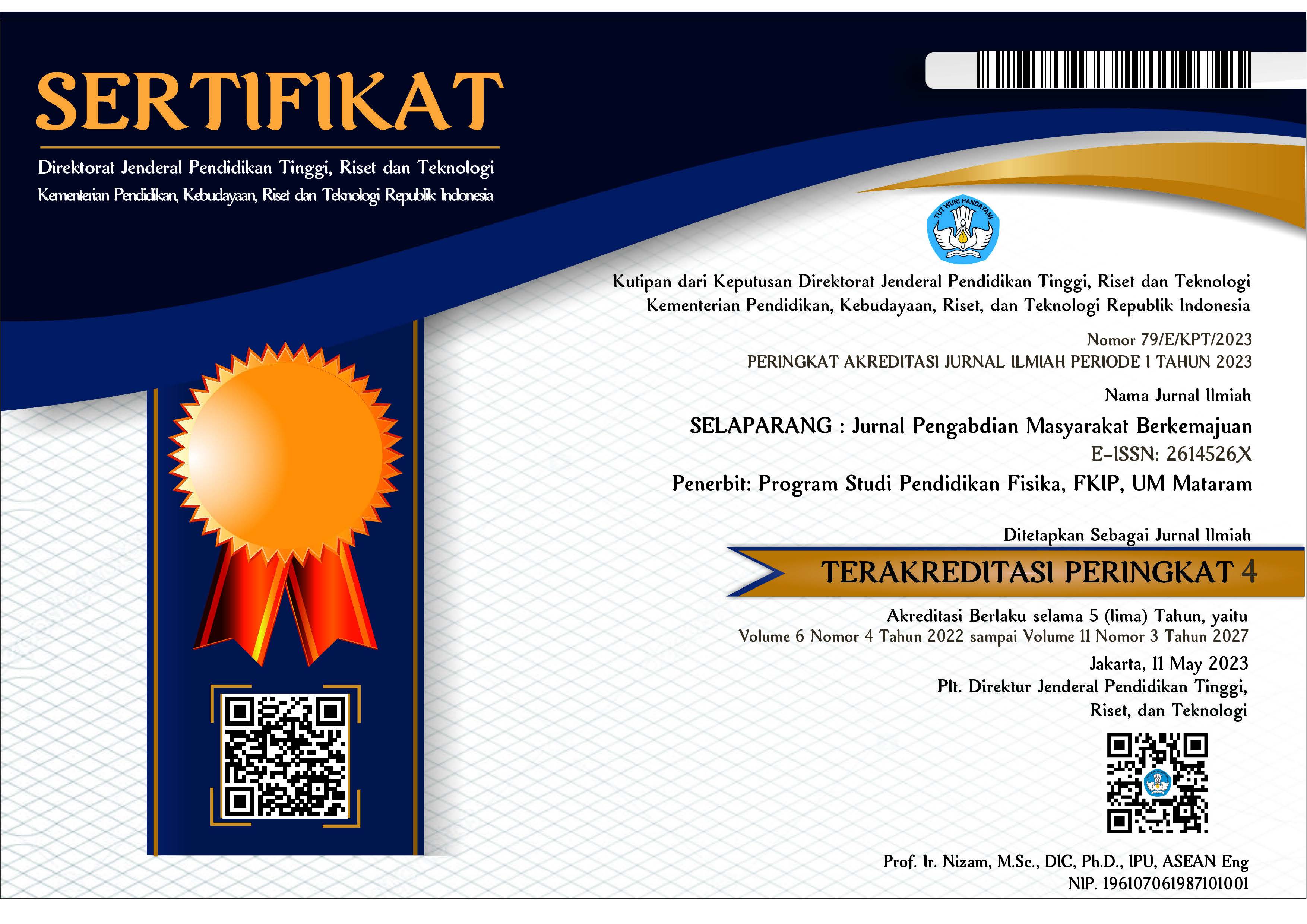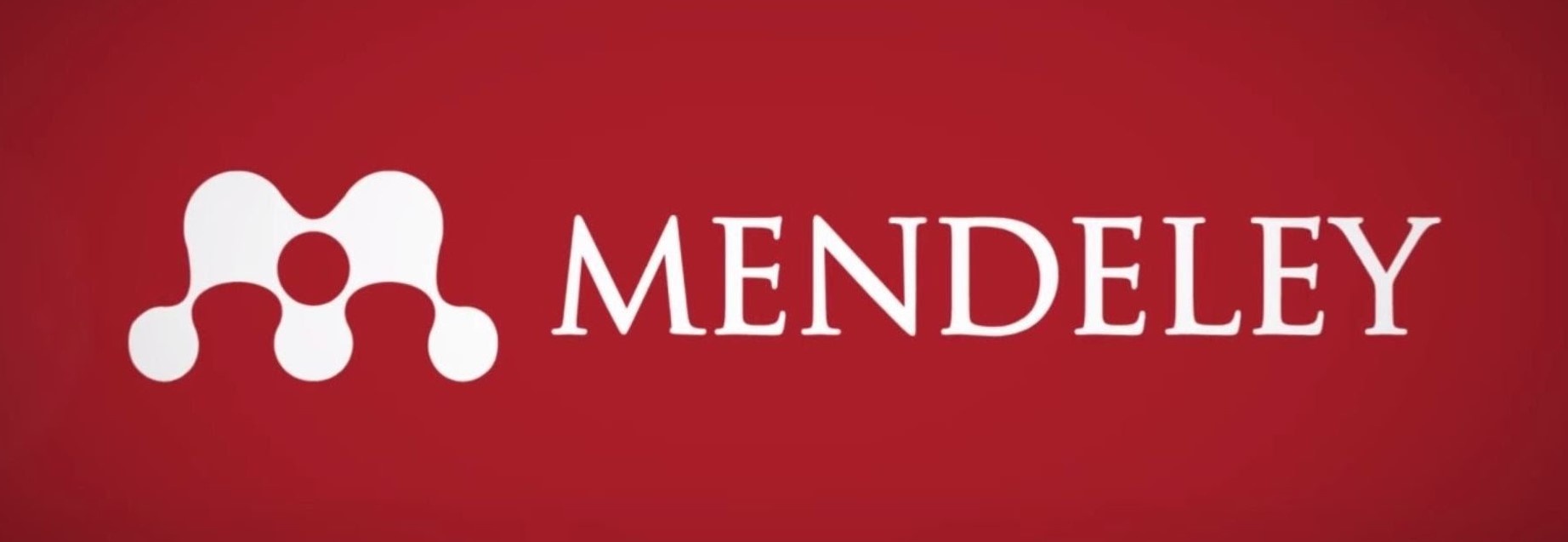PELATIHAN GAMIFICATION BERBASIS GAME-BASED VIRTUAL LEARNING ENVIRONMENT SEBAGAI PENUNJANG IMMERSIVE LEARNING
Abstract
ABSTRAK
Perkembangan teknologi menuntut guru dalam menghadirkan proses pembelajaran yang inovatif dan kreatif. Media pembelajaran yang terintegrasi dengan teknologi dapat menjadi daya tarik bagi siswa dalam meningkatkan kompetensi abad 21. Pengabdian ini bertujuan untuk mengetahui pengaruh pelatihan Gamification berbasis Game Based Virtual Learning Environment (VLE) terhadap kemampuan Guru dalam memahami basic gamification element. Metode kegiatan berupa pelatihan dengan menggunakan pretest dan posttest untuk mengukur kompetensi Guru dalam memahami basic gamification element. Tahapan pelaksanaan dilakukan dengan empat tahap yang terdiri dari: : 1) tahap assessment, 2) tahap persiapan, dan 3) tahap implementasi program dan 4) tahap evaluasi program. Subjek penelitian adalah Guru terutama Guru Geografi. Analisis data menggunakan Uji paired sample test dengan nilai N-Gain Score. Hasil pelatihan menunjukkan bahwa Guru dapat meningkatkan kemampuan dalam memahami basic gamification element melalui praktik.
Kata kunci: gamification; game-based virtual learning environment; geoedu workshop.
ABSTRACT
Technological developments require teachers to present innovative and creative learning processes. Learning media integrated with technology can be an attraction for students in improving 21st-century competence. This service aims to determine the effect of Gamification training based on Game Based Virtual Learning Environment on the teacher's ability to understand basic gamification elements. The activity method is training using a pretest and posttest to measure teacher competency in understanding basic gamification elements. The implementation stage is carried out in four stages consisting of 1) the assessment stage, 2) the preparation stage, 3) the program implementation stage, and 4) the program evaluation stage. The research subjects were teachers, especially geography teachers. Data analysis used a paired sample test with an N-Gain Score. The training results show that teachers can improve their understanding of basic gamification elements through practice.
Keywords: gamification; game-based virtual learning environment; geoedu workshop.
Keywords
Full Text:
PDFReferences
Al-Ghurbani, A. M., Jazim, F., Abdulrab, M., Al-Mamary, Y. H. S., & Khan, I. (2022). The impact of internal factors on the use of technology in higher education in Saudi Arabia during the COVID-19 pandemic. Human Systems Management, 41(2), 283–302. https://doi.org/10.3233/HSM-211219
Algebra, G. (2011). Skills Practice. Practice, 2011.
Aryanti, T., Supriyono, & Ishaq M. (2015). Evaluasi Program Pendidikan Dan Pelatihan Program Pasca Sarjana. Jurnal Pendidikan: Teori, Penelitian …, 5, 1–13. http://journal.um.ac.id/index.php/jptpp/article/view/13674
Bowyer, B., & Kahne, J. (2020). The digital dimensions of civic education: Assessing the effects of learning opportunities. Journal of Applied Developmental Psychology, 69(July), 101162. https://doi.org/10.1016/j.appdev.2020.101162
Carpenter, J. P., Rosenberg, J. M., Dousay, T. A., Romero-Hall, E., Trust, T., Kessler, A., Phillips, M., Morrison, S. A., Fischer, C., & Krutka, D. G. (2020). What should teacher educators know about technology? Perspectives and self-assessments. Teaching and Teacher Education, 95. https://doi.org/10.1016/j.tate.2020.103124
Crisianita, S., & Mandasari, B. (2012). The Use of Small Group Discussion To Improve Students. Journal of Research on Language Education (JoRLE), 3(1), 157–159.
Cuhadar, C. (2018). Investigation of pre-service teachers’ levels of readiness to technology integration in education. Contemporary Educational Technology, 9(1), 61–75. https://doi.org/10.30935/cedtech/6211
Daga, A. T. (2021). Makna Merdeka Belajar dan Penguatan Peran Guru di Sekolah Dasar. Jurnal Educatio FKIP UNMA, 7(3), 1075–1090. https://doi.org/10.31949/educatio.v7i3.1279
Del Blanco, Á., Marchiori, E. J., Torrente, J., Martínez-Ortiz, I., & Fernández-Manjón, B. (2013). Using e-learning standards in educational video games. Computer Standards and Interfaces, 36(1), 178–187. https://doi.org/10.1016/j.csi.2013.06.002
Farjon, D., Smits, A., & Voogt, J. (2019). Technology integration of pre-service teachers explained by attitudes and beliefs, competency, access, and experience. Computers and Education, 130, 81–93. https://doi.org/10.1016/j.compedu.2018.11.010
Fodness, D., & Bell, G. (2022). The HatPack: An Experiential Exercise for Enhancing Class Discussion Through Perspective Taking and Structured Controversy. Management Teaching Review, 237929812211104. https://doi.org/10.1177/23792981221110494
Gupta, A., & Gomathi, S. (2017). A review on gamification and its potential to motivate and engage employees and customers: Employee engagement through gamification. International Journal of Sociotechnology and Knowledge Development, 9(1), 42–52. https://doi.org/10.4018/IJSKD.2017010103
Hamari, J., & Koivisto, J. (2015). Why do people use gamification services? International Journal of Information Management, 35(4), 419–431. https://doi.org/10.1016/j.ijinfomgt.2015.04.006
Heckman, J. J., Pinto, R., & Savelyev, P. A. (2017). Learning Technologies In Education: Issues and Trends. In Angewandte Chemie International Edition, 6(11), 951–952.
Ihsan, F. A., Kurnianto, F. A., Nurdin, E. A., & Apriyanto, B. (2018). Geography Literacy of Observation Introduction Landscape Representation Place for Student Experience. Geosfera Indonesia, 3(2), 131. https://doi.org/10.19184/geosi.v3i2.8384
Indarta, Y., Jalinus, N., Waskito, W., Samala, A. D., Riyanda, A. R., & Adi, N. H. (2022). Relevansi Kurikulum Merdeka Belajar dengan Model Pembelajaran Abad 21 dalam Perkembangan Era Society 5.0. Edukatif : Jurnal Ilmu Pendidikan, 4(2), 3011–3024. https://doi.org/10.31004/edukatif.v4i2.2589
Kaur, M., & Saini, S. (2021). A review of metaheuristic techniques for solving university course timetabling problem. In Lecture Notes in Networks and Systems (Vol. 135). https://doi.org/10.1007/978-981-15-5421-6_3
Larson, K. (2020). Serious Games and Gamification in the Corporate Training Environment: a Literature Review. TechTrends, 64(2), 319–328. https://doi.org/10.1007/s11528-019-00446-7
Li, N. (2022). How Technology Promotes Educational Change: Studies of Virtual Learning Environment in Higher Education. July.
Mayer, I., Warmelink, H., & Bekebrede, G. (2013). Learning in a game-based virtual environment: A comparative evaluation in higher education. European Journal of Engineering Education, 38(1), 85–106. https://doi.org/10.1080/03043797.2012.742872
Mok, K. H., Xiong, W., & Bin Aedy Rahman, H. N. (2021). COVID-19 pandemic’s disruption on university teaching and learning and competence cultivation: Student evaluation of online learning experiences in Hong Kong. International Journal of Chinese Education, 10(1). https://doi.org/10.1177/22125868211007011
Nadu, T. (2022). Onlin Education A catalyst for Reforming Higher Education. Journal For Innovative Development in Pharmaceutical and Technical Science (JIDPTS), 19(6).
Putra, A., Sumarmi, & Deffinika, I. (2021). The effect of blended project-based learning with stem approach to spatial thinking ability and geographic skill. International Journal of Instruction, 14(3), 685–704. https://doi.org/10.29333/iji.2021.14340a
Putra, A.K., Sumarmi, S., Fajrilia, A., & Islam, M. N. (2022). Can games and task projects improve teacher’s digital pedagogic in senior high school? Preparing sustainability education during COVID-19 pandemic. Exploring New Horizons and Challenges for Social Studies in a New Normal, May, 94–98. https://doi.org/10.1201/9781003290865-18
Putra, Alfyananda Kurnia, Islam, M. N., Sasmito, D. A., & Yusrotin, A. (2021). Implementasi m-learning berbasis Mobile Context Aware System (MCAS) dalam pembelajaran Geografi pada masa pandemi Covid-19. Jurnal Integrasi Dan Harmoni Inovatif Ilmu-Ilmu Sosial, 1(5), 591–597. https://doi.org/10.17977/um063v1i5p591-597
Putra, Alfyananda Kurnia, Purwanto, Islam, M. N., Hidayat, W. N., & Fahmi, M. R. (2022). Development of Mobile Virtual Field Trips in Ijen Crater Geosites Based on 3600 Auto Stereoscopic and Geospatial Technology As Geography Learning Media. Geojournal of Tourism and Geosites, 41(2), 456–463. https://doi.org/10.30892/GTG.41216-850
Putra, Alfyananda Kurnia, Sumarmi, A. S., Fajrilia, A., Islam, M. N., & Yembuu, B. (2021). Effect of Mobile-Augmented Reality (MAR) in Digital Encyclopedia on The Complex Problem Solving and Attitudes of Undergraduate Student. International Journal of Emerging Technologies in Learning, 16(7), 119–134. https://doi.org/10.3991/ijet.v16i07.21223
Putra, Alfyananda Kurnia, Sumarmi, S., Handoyo, B., Purwanto, P., & Islam, M. N. (2021). Pengembangan virtual field trips berbasis Geospatial Technology: Peningkatan kompetensi TPACK guru melalui GeoEdu Workshop. Jurnal Integrasi Dan Harmoni Inovatif Ilmu-Ilmu Sosial (JIHI3S), 1(12), 1354–1363. https://doi.org/10.17977/um063v1i12p1354-1363
Rahayu, R., Rosita, R., Rahayuningsih, Y. S., Hernawan, H., & Prihatin. (2021). Jurnal basicedu. Jurnal Basicedu, 5(4), 2541–2549. https://doi.org/10.31004/basicedu.v5i4.1230
Ramírez, P., Ramírez, H., Infante, L. D., López, J. M., Rosquillas, J., Villegas, A. L., Santana, D., & De La Vega, D. (2013). Explora méxico: A mobile application to learn mexico’s geography. Procedia Computer Science, 25(December 2013), 194–200. https://doi.org/10.1016/j.procs.2013.11.024
Ružic, I. M., & Dumancic, M. (2015). Gamification in education. Informatologia, 48(3–4), 198–204. https://doi.org/10.17759/jmfp.2016050302
Sáez-López, J. M., Miller, J., Vázquez-Cano, E., & Domínguez-Garrido, M. C. (2015). Exploring application, attitudes and integration of video games: Minecraftedu in middle school. Educational Technology and Society, 18(3), 114–128.
Shahroom, A. A., & Hussin, N. (2018). Industrial Revolution 4.0 and Education. International Journal of Academic Research in Business and Social Sciences, 8(9), 314–319. https://doi.org/10.6007/ijarbss/v8-i9/4593
Sherly, Dharma, E., & Sihombing, H. B. (2020). Merdeka Belajar: Kajian Literatur. UrbanGreen Conference Proceeding Library, 1, 183–190.
Susanti, L. M. A., & Rediani, N. N. (2022). Pelatihan Peningkatkan Keterampilan Literasi Melalui Balinese Folklore Berbantuan Media Call. International Journal of Community Service Learning, 6(1), 97–103. https://doi.org/10.23887/ijcsl.v6i1.46059
Wang, Y. F., Hsu, Y. F., & Fang, K. (2022). The key elements of gamification in corporate training – The Delphi method. Entertainment Computing, 40(July 2021), 100463. https://doi.org/10.1016/j.entcom.2021.100463
Wardana, L. K., & Wulaningrum, P. D. (2020). Pendampingan Pencatatan Keungan Terekomputerisasi Kopreasi Simpan Pinjam Ibu PKK RT 06/Dusun Sengon Karang RT 06 Argomulyo Sedayu bantul. Jurnal Penelitian Dan Pengadiba Masyarakat, 8(2), 154–161.
Xue, K., Huggins-Manley, A. C., & Leite, W. (2022). Semisupervised Learning Method to Adjust Biased Item Difficulty Estimates Caused by Nonignorable Missingness in a Virtual Learning Environment. Educational and Psychological Measurement, 82(3), 539–567. https://doi.org/10.1177/00131644211020494
Yani, A., Ruhimat, M., & Mulyadi, A. (2021). The effect of TPACK framework on inquiry process: A study of geographic subject. IOP Conference Series: Earth and Environmental Science, 683(1). https://doi.org/10.1088/1755-1315/683/1/012027
DOI: https://doi.org/10.31764/jpmb.v6i4.12084
Refbacks
- There are currently no refbacks.

This work is licensed under a Creative Commons Attribution-ShareAlike 4.0 International License.
______________________________________________________
Jurnal Selaparang
p-ISSN 2614-5251 || e-ISSN 2614-526X
EDITORIAL OFFICE:



















